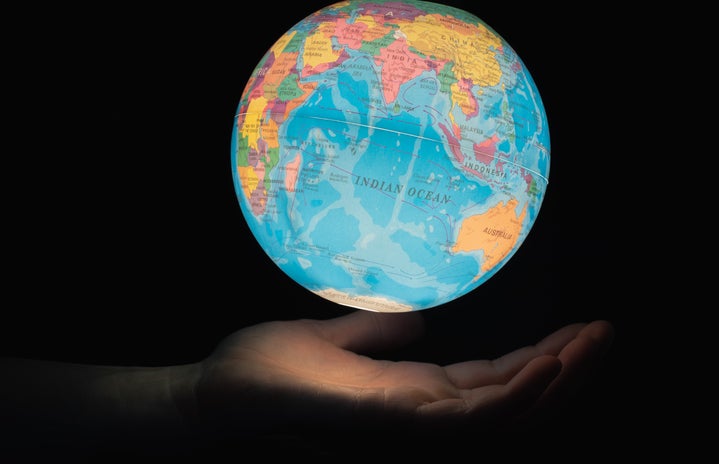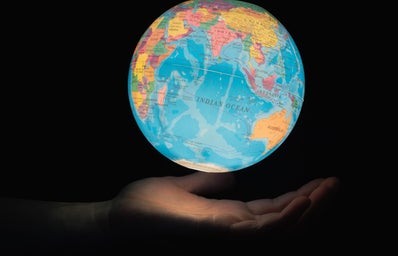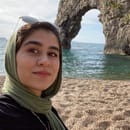Instagram is a diverse platform. At times harmful, but often a source of comfort and community to those who need it. During one encounter I had with it, I discovered a page that resonated deeply with me – a page chronicling the nuance of identity. I am a Pakistani student who has been living in London for 5 years now, my father is Pakistani and my mother is from Antananarivo, Madagascar. The languages that are commonly spoken in my household are English, Urdu, Gujrati, Kutchi, and French.
As such, I have always found it difficult to answer the age-old question posed by strangers and friends–‘where are you from?’–and the answer is, I don’t feel like I’m ‘from’ anywhere. Pakistan is the place and culture with which I have interacted the most, but I can no longer say it is the place wherein I feel most at home. I realise how this must sound, I moved to London and no longer feel a deep resonance with my homeland, but I suppose this feeling has accompanied me all my life. I was never taught that the Pakistani culture was mine, with all its positives and negatives; I was rather brought up with the idea that I can choose what resonates with me and what I simply cannot identify with. I have continued this practice until today, a 21 year old student living in London. To explain this further, I think it best to share with you the Instagram page I found which made me realise I am not alone in this unique diaspora – The Hybrid South Asian.
The Hybrid South Asian is a page that chronicles the stories of South Asian men and women whose roots span wider than most and can thus produce more confusion than most. The page is filled with stories of people finding their place in the world and navigating their rich cultural heritage while reconciling it with the new people, cultures, and ideologies they choose to adopt. In wanting to know more about this page and concept, I interviewed the proprietor and mind behind The Hybrid South Asian, Masuma Ali.
Q. What inspired you to start this page?
A. I’d always played with ideas similar to the page in my head for some time, thinking how cool it would be to have a platform like this, but I hadn’t really explored it and I initially thought it would be a good book idea. So, when I got furloughed from my job in April due to Covid, there wasn’t a better time to really pan the idea out and so it evolved into an Instagram page.
Once again, it’s nice to see Instagram being used to create a meaningful and safe space for individuals to express themselves, rather than a platform of feigned sociability and snap shots of illusory productivity.
Q. What does identity mean to you?
A. For me, identity forms layers of a person. Along with nationalities, cultures, ethnicities and religions – experiences also heavily contribute to one’s identity. More specifically, the interlocking nature of experiences with broad aspects of nationality, culture etc are what form a unique identity. I’ve always struggled with my identity. It’s difficult to keep identity constant and the same as always. In reality, over time, identity evolves too. Nowadays, I find myself always trying to make sure I am not becoming more British at the expense of my Indianness or my Gujarati East African culture. That’s because I never thought I could ever be British. In my mind, moving here rather than being born here equated to never being able to be British, never mind what a passport shows. There’s so many aspects to my identity and I’ve learnt how to look at them in a way that allows me to accept a mesh of all of them.
I am an avid subscriber to the notion that identity is never complete. With each day we grow, learn, and evolve in subtle ways from the people we were yesterday. We’re always in a state of ‘becoming’. Honestly, I don’t think identity should ever be complete, because where’s the fun in that? To be the same person you were yesterday is to remain in a state of stagnancy, to not do justice to the life and opportunities you have been given, and so identity, for me, is that gift that keeps on giving.
Q. Have any of the submissions you’ve received deeply resonated with you or stayed with you?
A. A lot of the submissions do stay with me because I love hearing other people’s stories. It’s the ones that display an identity more complex than my own that really stay with me. It’s honestly beautiful how many meshes of identity we have in this community, and these are just within South Asians.
The Hybrid South Asian page shares these complex stories through photographs, memories, anecdotes, and most interestingly, wraps up each post with an image of two pie charts. The first pie chart portrays the individual’s ‘cultural allocation’ and the second details their ‘socialised identity’. The second chart often includes anything from their birth nationality, to their career aspirations, and their deepest passions. It is fascinating to see the different ways in which people evolve and learn how malleable, yet unique, one’s own identity can be.
Q. What have you achieved or hope to achieve with this page? What kind of change do you want to make?
A. I just want it to be a space where we can discuss our identity and be okay with it. There’s no right answer. One thing that’s really touched me is when people tell me they’re glad they sat down and thought about their identity. Many, when initially asked to do an entry, were hesitant, because their identity is so complex that explaining it is difficult or just because they haven’t thought about it. But when they eventually submit, they always thank me for giving them the opportunity to sit down and really evaluate it. Reflecting on identity is a process of self-discovery, which is so important for those of us with a hybrid identity.
Sitting down with oneself and grappling with what makes you ‘you’ is a daunting task. Sometimes, it’s really not fun, but the breakthrough of coming out on the other side is almost always worth the confusion, and even the pain we feel when really trying to grasp who we are and where we come from.
Q. Can you shed some light on the positive and negative aspects of the lack of categorization when you have more than one nationality?
A. On the positive side, my own hybrid identity and reading other people’s entries have highlighted that it is quite a privilege to have so much definition to our identity and have the ability to pick parts that we like from different identity aspects to form our own hybrid identity. So, while having an identity made up of various cultures and nationalities is hybrid in itself, we also create our own sub-hybrid identities to suit ourselves as individuals.
A main negative aspect would be the constant feeling of never fully belonging. It’s sometimes tiring to have so many different identity traits that you feel like you can’t entirely belong to just one of them only. And even your experience of it is different to someone who only holds that identity alone. For example, my experience of being Indian is completely different to an Indian who has been born and raised in India, because my experience is intertwined with being brought up in Tanzania and then moving to the UK along with being Muslim as well. In the same way, I could never fully understand what it’s like to be completely British. Migrating, especially at a tender age of 11, does a lot to hinder the growth and understanding of one’s identity and I’ve been in so many phases of my identity since then. Only now am I sort of settling into what I think might be something I resonate with. But as I have mentioned, identity is always evolving as you have more experiences.
Growing up in Pakistan, the dominant culture in my life was the Pakistani culture, everything that my father grew up with. This left a formidably large gap in my understanding and knowledge of the culture my mother grew up in. My speaking proficiency of Gujarati and Kutchi is beginners’ level at best, and I missed out on the French speaking aspect of her culture entirely. Every time I visit Madagascar, my great uncles wonder why I cannot converse with them in fluent Gujarati, why I find the food so unique and the culture so different. I sometimes regret the lack of exposure I received to my mother’s world and I feel the effects most strongly today, when speaking to my grandparents in broken Gujarati really isn’t ‘cute’ anymore. But I’m learning more every day, meeting and assimilating into the community of East Africans living in London. I am progressively starting to reconcile the two sides of me that have always involuntarily been unequal in my knowledge and understanding of them. But now, I am making the choice to learn more, choosing to embrace it all.
Q. Do you feel like identity limits you? Have you ever considered the concept of no identity, that it is just a construct or a label?
A. Not at all. I feel like certain aspects of identity like culture can limit you if you submit to its limitations. But overall, not at all. I find having a hybrid identity to be less limiting than having just one nationality and culture. This is because I am not bound to one country and so I don’t feel patriotic to any of the countries that I identify with. Having a hybrid identity allows you to disregard any limitations that might come with certain aspects of it because we’re able to choose the best parts of each and mesh it into our identity. That itself is a construct. Identity is a construct – we’ve created our borders of nationality and cultural norms.
There is something undoubtedly freeing about choosing what you resonate with, regardless of the values and traditions you were born into. I think that freedom is one of the best parts of having a hybrid identity because growing up with many differing values and understandings, you no longer feel like you have to limit what you believe and who you choose to be. As you grow older you begin to combine the new places you see and the people you meet with your experience and understanding of who you are. And with the evolution of identity comes growth.
Today, I am still exploring how to integrate all the unique aspects of my identity into a complete whole, but I have come to the realisation that I don’t have to. I choose to embrace the hospitality and generosity that I have inherited from my Pakistani culture, and the strong values of family and community that are of intense importance in my East African culture. This blend of beautiful and unique values makes up the 21-year-old Londoner writing this today.



